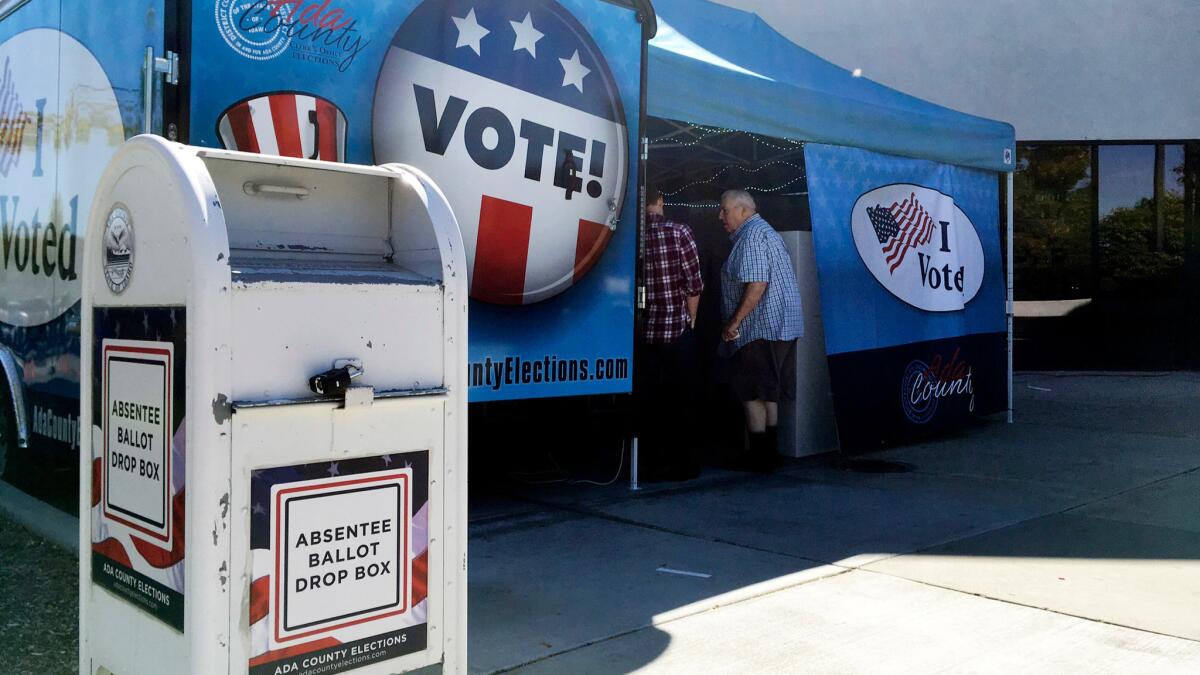Op-Ed: Ten questions, and answers, about the electoral college

Every four years, we pick our president in an exceedingly odd way: through the electoral college. Below you’ll find 10 common questions about our system and its history, and the answers that best reflect modern scholarship rather than the myths that still dominate civics textbooks.
1. Was the electoral college designed to balance big and small states?
Not really. The Congress was indeed so designed, with the House favoring populous states and the Senate giving each state two votes regardless of population. But in the electoral college, big states have more sway, and they have since the beginning.
2. What about the idea that the framers distrusted direct democracy?
It’s overstated. The framers put the Constitution itself to a popular vote of sorts, provided for direct election of House members (thus breaking with the Articles of Confederation) and favored direct election of governors.
3. Were electors ever expected to make up their own minds?
From 1789 to today, most electors have been undistinguished no-names doing as they were told by whomever picked them. Early on, state legislatures did much of the picking, but soon, popular elections prevailed in most states.
4. Doesn’t the electoral college vindicate American federalism, treating each state seriously?
Yes, but so would a direct national election. Currently, states have little incentive to encourage voting. A state gets the same number of electoral votes no matter what. But in a direct national election system, any state encouraging broad voter participation would have more clout in the final result. States might compete and experiment with different ways to promote voter participation — federalism at its best.
5. Besides federalism, what is the best explanation for why we have an electoral college?
Slavery. In a direct-election system, the South would have lost every time because a huge proportion of its population — slaves — could not vote. The electoral college enabled each slave state to count its slaves (albeit at a discount, under the Constitution’s three-fifths clause) in the electoral college apportionment. The big winner early on was Virginia — a large state with lots of slaves. Indeed, eight of the first nine presidential elections were won by Virginians. Pennsylvania in 1800 had more free persons, but Virginia got more electoral votes that year. Thomas Jefferson would have lost the race against John Adams in 1800 but for the fact that the Southern states that backed Jefferson, a Southerner, got a dozen extra electoral votes because of their enslaved population. After 1800, the South refused to make any change that might weaken its inside track.
6. Now that slavery is abolished, why should we keep the system?
Maybe we shouldn’t. We pick governors in every state by direct election — one person, one vote. If this system works well for governors, it should work for presidents. Almost all modern-day defenses of the electoral college — avoiding recounts, boosting rural areas, etc. — are make-weight. If these arguments are sound, then every state is dumb in its gubernatorial election system. And states, in general, are not dumb. Nor are the other major democracies across the planet, none of which has an electoral college.
7. Can states agree among themselves to give their electoral votes to the national popular vote winner?
Yes, and several states, including California, already have pledged to do so if enough other states join the reform bandwagon. This state-led reform movement — the National Popular Vote Interstate Compact — will not affect the 2016 race, but it might change the rules for 2020 and beyond.
8. What’s so great about direct election?
It counts all voters equally — just as each state counts all voters equally in a governor’s race.
9. How about encouraging states to move away from winner-take-all within the state?
Nebraska and Maine do this already. Whoever wins a congressional district gets one electoral vote for that district, and whoever wins the state as a whole gets two bonus electoral votes (corresponding to the state’s two senators). This system is OK for Nebraska and Maine, but it would be bad for other states. Nebraska has only three congressional districts; Maine has two. So whoever wins each state is mathematically guaranteed to win at least a majority of the state’s electoral votes. (Call it winner-take-most-and-maybe-all.) But in bigger states — Pennsylvania, for example — a candidate who wins a large statewide majority might actually fail to win a majority of the state’s electoral votes, which hardly seems fair — especially because congressional district shapes can be gerrymandered.
10. Is the current electoral college system skewed toward either party?
No, it’s pretty balanced at present. True, it favored George W. Bush in 2000, but it could just as easily have favored Al Gore had the election season unfolded differently. Today, Democrats tend to win more big states, which gives them a boost, thanks to winner-take-all. But Republicans tend to win more states overall, which gives them an offsetting boost because each state starts with a two-electoral-vote bonus.
Akhil Reed Amar teaches constitutional law at Yale and is the author of “The Constitution Today: Timeless Lessons for the Issues of our Era.”
Follow the Opinion section on Twitter @latimesopinion and Facebook
More to Read
A cure for the common opinion
Get thought-provoking perspectives with our weekly newsletter.
You may occasionally receive promotional content from the Los Angeles Times.










